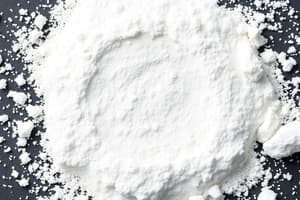Podcast
Questions and Answers
What is the study of matter?
What is the study of matter?
Chemistry
What is anything that has a volume called?
What is anything that has a volume called?
Matter
What are substances that have only one type of particle?
What are substances that have only one type of particle?
Pure Substances
What cannot be broken down further chemically?
What cannot be broken down further chemically?
What do you call combinations of elements in fixed proportions?
What do you call combinations of elements in fixed proportions?
What consists of 2 or more pure substances combined?
What consists of 2 or more pure substances combined?
What is a mixture called that has all one visible phase?
What is a mixture called that has all one visible phase?
What type of mixture has 2 or more visible phases?
What type of mixture has 2 or more visible phases?
What are particles that do not settle to the bottom and pass the Tyndall effect?
What are particles that do not settle to the bottom and pass the Tyndall effect?
What happens when you shine a light through a colloid?
What happens when you shine a light through a colloid?
What type of mixture has particles that eventually drop to the bottom?
What type of mixture has particles that eventually drop to the bottom?
What type of mixture allows you to see all the distinct parts?
What type of mixture allows you to see all the distinct parts?
Flashcards are hidden until you start studying
Study Notes
Chemistry
- Study of matter and its properties, changes, and interactions.
Matter
- Defined as anything that possesses volume and occupies space.
Pure Substances
- Consists of a single type of particle, creating a uniform composition.
Elements
- Fundamental substances that cannot be chemically broken down into simpler materials.
Compounds
- Chemical combinations of two or more elements in a fixed ratio, having distinct properties.
Mixtures
- Combinations of two or more pure substances, retaining their individual properties.
Homogeneous Mixture
- Consists of a single visible phase, appearing uniform throughout.
Heterogeneous Mixture
- Contains two or more visible phases or components that can be distinguished.
Colloids
- A type of mixture where particles remain suspended and do not settle, exhibiting the Tyndall effect.
Tyndall Effect
- Phenomenon where light is scattered by particles in a colloid, making it appear luminous.
Suspensions
- Mixtures where larger particles eventually settle out, separating from the liquid.
Mechanical Mixtures
- Mixtures where the distinct parts can be visually identified and separated.
Studying That Suits You
Use AI to generate personalized quizzes and flashcards to suit your learning preferences.




